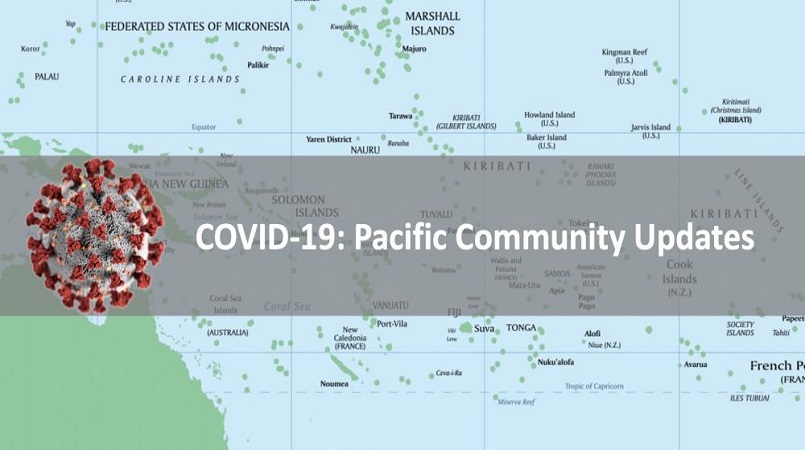
The COVID-19 (COrona VIrus Disease 2019) outbreak was declared a pandemic by the World Health Organization (WHO) on 11 March 2020.
Globally, nations are taking actions to reduce and control the spread of the virus.
Between 31 March and 03 April 2020, 36 new cases have been confirmed in the Pacific Island Countries and Territories (PICTs).
As of 03 April 2020, 6 countries (Commonwealth of the Northern Marianas (CNMI), Papua New Guinea, Fiji, French Polynesia, Guam and New Caledonia) in the PICTs have reported 153 cases including 4 deaths, excluding the number of cases from USS Theodore Roosevelt currently docked in Guam.
Restrictions in place
- Samoa, Solomon Islands, Papua New Guinea, Tonga, Vanuatu and Tuvalu have declared states of emergency.
- The Marshall Islands and Federated States of Micronesia have completely sealed their borders.
- The Cook Islands are in Code Yellow recommending people work from home.
- New Caledonia self-quarantine measures continue.
- Niue and Kiribati are at Level 4 alert with a stay at home policy.
- CMNI is under nationwide curfew from 7pm to 6am daily.
- Fiji is under a nationwide curfew from 8pm to 5am daily. Lautoka and Suva are under full lockdown.
- French Polynesia is under nationwide curfew from 8pm to 5am till 15 April.
- Tonga is under nationwide curfew from 8pm to 6am.
Regional Challenges
COVID-19 represents a significant challenge for the region. The Pacific Community (SPC), as the Council of Regional Organisations in the Pacific (CROP) lead in public health, has taken all necessary measures to help address the spread of COVID-19. This includes the adoption of a response framework aimed at supporting staff well-being and business continuity while supporting an efficient regional response to the pandemic.
Which are the main risk areas for PICTs?
- In most of the PICTs, access to quality health services is limited, due to a lack of infrastructure, equipment, and qualified personnel. In the current situation, this can pose a problem of access to care if the number of infected people increases.
- Most PICTs do not have the needed laboratory equipment to analyse the tests on site, which creates difficulties in identifying cases. The test samples have to be sent to other countries for analysis.
- Pacific Island Countries and Territories (PICTs) are frequented by tourists. This represents a risk due to the movement of people to and from PICTs (although restrictive measures have been put in place); and also a risk for the local economies.
What is SPC doing to help its member countries and territories deal with the current COVID-19 pandemic?
- SPC is supporting PICTs preparedness and their responses to COVID-19 through public health surveillance, infection prevention and control, risk communication, disaster management, humanitarian response, statistics, educational assessment, data custodianship and GIS mapping.
- SPC is part of the World Health Organization (WHO)-led multi-agency Incident Management Team (IMT).
- Along with its partners, SPC also implements all relevant preparedness activities to help its members manage the risks associated with the virus including;
- The deployment of staff to do in-country training on COVID-19 case identification, contact tracing, case investigation, outbreak management;
- The deployment of staff to do in-country assessment and training on infection control.
- SPC provides funding for laboratory sample shipment and testing, in order to help its members identify potential cases and respond accordingly.
- SPC coordinates the procurement process for point-of-care test (BD Veritor System) to allow in-country confirmation of influenza cases, thereby facilitating proper case management.
- SPC is the focal point of the Pacific Public Health Surveillance Network (PPHSN). PPHSN includes six services to prevent and respond to epidemics. These include coordination of laboratory services, surveillance systems, infection control, alert and communication, knowledge exchange and capacity building.
- SPC continues to coordinate the implementation of the Strengthening Health Interventions in the Pacific (SHIP) programme, to develop and strengthen competencies in epidemiology, surveillance, outbreak investigation and management, risk communication and reporting.
What is SPC doing to protect its staff?
- SPC has activated a Security Management Group, in order to assess potential impacts and consequences of COVID-19 in SPC premises, prepare and respond appropriately to mitigate these risks, and communicate timely and helpful information to all staff of the organization and its members.
- SPC has implemented a wide range of measures to limit the spread of the virus, such as limiting non-essential travel and postponing events and meetings and instituting a work from home policy.
- Bi-weekly staff communication with health and travel advisories are circulated directly to staff members (in English and French language) and made available online.
